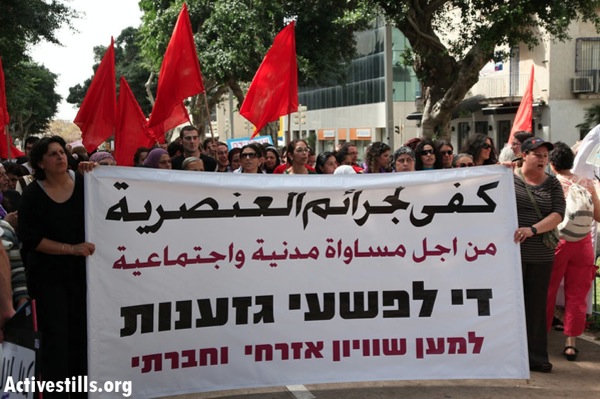In the Middle East, representation of women in the public sphere is lower than in any other region. Women face enormous obstacles, ranging from sexual harassment and honor killings to ingrained patriarchal attitudes that belittle their intelligence and value. That is why it was so uplifting to watch the women of Tahrir Square take a leading role in the revolution of January 25
By Yael Lavie
About half a century ago Tammy Wynette, of American country music fame, had a hit single with a song called: Stand By Your Man. Its lyrics are possibly one of the most terrifying examples of where western women were at the time, best illustrated by one of its verses (please read in thick American southern accent):
You’ll have bad times
And he’ll have good times
Doin’ things that you don’t understandBut if you love him
You’ll forgive him
Even though he’s hard to understand
The song begins with a promising recognition line: ‘Sometimes it’s hard to be a woman’ which none of us women around the world will disagree with, not since the song was written and to this day. It goes down hill from there to the ‘Just bear and grin it, hopefully barefoot in kitchen’ verses as the one above.
Indeed sometimes it’s hard to be a woman anywhere – and most of the time it is very hard to be a woman in the Middle East. Here, standing by your man does not just mean baking brownies, mixing martinis and silently putting his ‘pain’ above yours while remembering to put on some lipstick at the same time.

The women of the Middle East live in a region that has spawned the history of patriarchal society, a modus operandi which in most nations across it is still strictly adhered to without any attempts to disguise it.
A laundry list to name a few:
Egypt: report by the Egyptian Center for Women’s Rights says 83 percent of Egyptian women are being exposed to harassment on the street and public transport almost daily. The highest statistic of sexual harassment in Middle Eastern countries.
Turkish Kurdistan: As Turkey tries to gain more favors with the EU in order to join it, it has been notified that if “honor killings” do not stop Turkey stands no chance of being considered as an EU member. Subsequently the Turkish government imposed stricter punishment on men accused of “honor killings” predominantly in the impoverished and oppressed Kurdish areas of Turkey. Subsequently again, the women and girls suspected of dishonoring their families, sometimes by merely being caught listening to the wrong music at the wrong place, have been faced with a new phenomenon called “honor suicides” in which the girl “suspected of dishonor” is locked in a room with a gun and rat poison, minus any food and forced to kill herself as to help the patriarchal traditional enablers avoid legal punishment.
Israel: The country that prides itself as the progressed democracy of the region is also the one that elected a president, Moshe Katzav, in spite of a fairly proven track record of systematically sexually harassing women and raping them for more than a decade – a fact known to his close circle and by assumption also his electors. Finally tried and convicted this year it is still a country that not only enabled him but also handed him a high powered ceremonial position.
As an overview, in a recent Freedom House organization study published by Sameena Nazir titled: Challenging Inequality: Obstacles and Opportunities Towards Women’s Rights in the Middle East and North Africa, the author details:
“The participation of women in political life in MENA countries is the lowest in the world. Women are not allowed to vote in Saudi Arabia. In some countries, women are barred from certain professions, and many women face social pressures to remain at home and eschew a career. Although some countries under review have enacted laws prohibiting gender discrimination, few offer women the practical mechanisms to bring complaints of bias”.
Rising up for equality in the Middle East is not going to be the same journey as the one for women of the western world. Indeed, It is hard to be a woman all over, sadly in this region rising up for your rights can cost you not only your reputation but your life.
That is why it was inspiring to see the women of Egypt march to the streets of Cairo on Tuesday, no doubt with new courage fueled by the recent revolution there. They returned to Tahrir square, where the revolution began and in which they played a pivotal role, for a “Million Woman March.” Their march was meant to remind Egypt that they should have a voice in its future – their rights granted upheld and preserved. You can rest assured their chants did not include anything remotely close to Tammy Wynette’s Stand By Your Man – and thank goodness that is so.
Yael Lavie is a writer, journalist and television producer living in Tel Aviv
